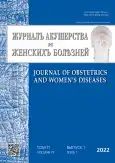Technology for early differential diagnosis of hypertensive disorders during pregnancy
- Authors: Mudrov V.A.1, Mudrov A.A.2
-
Affiliations:
- Chita State Medical Academy
- State Novosibirsk Regional Clinical Hospital
- Issue: Vol 71, No 1 (2022)
- Pages: 47-58
- Section: Original study articles
- Submitted: 27.09.2021
- Accepted: 24.12.2021
- Published: 15.01.2022
- URL: https://journals.eco-vector.com/jowd/article/view/81180
- DOI: https://doi.org/10.17816/JOWD81180
- ID: 81180
Cite item
Abstract
BACKGROUND: To date, no test provides sufficient sensitivity and specificity for the early diagnosis of severe preeclampsia. Meanwhile, severe preeclampsia is a condition that threatens the life of not only the mother, but also the fetus, and requires a solution to the issue of delivery. Therefore, the search for markers of severe preeclampsia is still relevant today.
AIM: The aim of this study was to create a technology that allows for early differential diagnosis of hypertensive disorders during pregnancy based on a comprehensive analysis of echocardiographic data.
MATERIALS AND METHODS: Based on the data collected in the Regional Clinical Hospital Perinatal Center, Chita, Russia in 2018-2021, the retrospective analysis of 112 cases of labor was carried out. The total sample was divided into five study groups: 30 relatively healthy women (group 1); 25 patients with chronic arterial hypertension (group 2); 21 patients with gestational arterial hypertension (group 3); 13 patients with moderate preeclampsia (group 4); and 23 patients with severe preeclampsia (group 5). The groups were formed in accordance with current clinical guidelines. Echocardiographic examination in all cases was carried out upon admission to the hospital. Statistical processing of the results was performed using the IBM SPSS Statistics Version 25.0 program.
RESULTS: The technology for early differential diagnosis of hypertensive disorders during pregnancy is implemented based on a multilayer perceptron, the percentage of incorrect predictions being 20.5 %. The structure of the trained neural network included six input neurons: gestational age, left atrium size in the parasternal position, right ventricular size, interventricular septal thickness, systolic blood flow velocity, and pressure gradient in the pulmonary artery.
CONCLUSIONS: Comprehensive analysis of echocardiographic data allows for early differential diagnosis of hypertensive disorders during pregnancy, while considering the result of neural network analysis as an additional criterion for severe preeclampsia. In the future, the use of this technology in clinical practice will not only optimize the tactics of managing patients with hypertensive disorders at admission to the hospital, but also reduce the incidence of adverse obstetric and perinatal outcomes.
Full Text
About the authors
Victor A. Mudrov
Chita State Medical Academy
Author for correspondence.
Email: mudrov_viktor@mail.ru
ORCID iD: 0000-0002-5961-5400
Scopus Author ID: 57204736023
MD, Cand. Sci. (Med.), PhDs in Medicine, assistant of professor of the obstetrics and gynecology department of the medical and dental faculties
Russian Federation, 39a, Gorky St., Chita, 672000Andrey A. Mudrov
State Novosibirsk Regional Clinical Hospital
Email: andrey.mudrov@mail.ru
ORCID iD: 0000-0002-8780-8007
MD, cardiovascular surgeon
Russian Federation, NovosibirskReferences
- Agrawal A, Wenger NK. Hypertension during pregnancy. Curr Hypertens Rep. 2020;22(9):64. doi: 10.1007/s11906-020-01070-0
- Spadarella E, Leso V, Fontana L, et al. Occupational risk factors and hypertensive Disorders in pregnancy: A systematic review. Int J Environ Res Public Health. 2021;18(16):8277. doi: 10.3390/ijerph18168277
- Akusherstvo: uchebnik. Ed. by V.E. Radzinsky, A.M. Fuks. Moscow: GEOTAR-Media; 2016. (In Russ.)
- Klinicheskie rekomendatsii (protokol lecheniya) No. 15-4/10/2-3483 “Gipertenzivnye rasstroystva vo vremya beremennosti, v rodakh i poslerodovom periode. Preeklampsiya. Eklampsiya”, utverzhdennye Ministerstvom zdravookhraneniya Rossiyskoy Federatsii 07.06.2016. (In Russ.). [cited 16 Sept 2021]. Available from: https://sudact.ru/law/pismo-minzdrava-rossii-ot-07062016-n-15-4102-3483/
- Armaly Z, Zaher M, Knaneh S, Abassi Z. Preeclampsia: pathogenesis and mechanisms based therapeutic approaches. Harefuah. 2019;158(11):742−747.
- Reddy M, Rolnik DL, Harris K, et al. Challenging the definition of hypertension in pregnancy: a retrospective cohort study. Am J Obstet Gynecol. 2020;222(6):606.e1−606.e21. doi: 10.1016/j.ajog.2019.12.272
- De Haas S, Ghossein-Doha C, Geerts L, et al. Cardiac remodeling in normotensive pregnancy and in pregnancy complicated by hypertension: systematic review and meta-analysis. Ultrasound Obstet Gynecol. 2017;50(6):683−696. doi: 10.1002/uog.17410
- Ul’trazvukovoe issledovanie serdca i sosudov. Ed. by O.Yu. Atkov. Moscow: Eksmo; 2015. (In Russ.)
- International Committee of Medical Journal Editors. Uniform requirements for manuscripts submitted to biomedical journals: writing and editing for biomedical publication. 2011. [cited 16 Sept 2021]. Available from: http://www.icmje.org/about-icmje/faqs/icmje-recommendations/
- Lang TA, Altman DG. Statistical analyses and methods in the published literature: The SAMPL guidelines. Medical Writing. 2016;25(3):31−36. doi: 10.18243/eon/2016.9.7.4
- Robles NR, Macias JF. Hypertension in the elderly. Cardiovasc Hematol Agents Med Chem. 2015;12(3):136−145. doi: 10.2174/1871525713666150310112350
- Sadov RI, Panova IA, Nazarov SB, et al. Changes in the indicators of thromboelastography and platelet function in pregnant women with various forms of hypertensive disorders in the third trimester of pregnancy. Klin Lab Diagn. 2020;65(5):281−288. doi: 10.18821/0869-2084-2020-65-5-281-288
- Katz D, Beilin Y. Disorders of coagulation in pregnancy. Br J Anaesth. 2015;115(Suppl 2):ii75−88. doi: 10.1093/bja/aev374
- Romero R, Dey SK, Fisher SJ. Preterm labor: one syndrome, many causes. Science. 2014;345(6198):760−765. doi: 10.1126/science.1251816
Supplementary files









